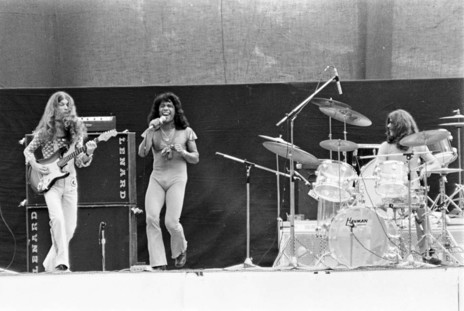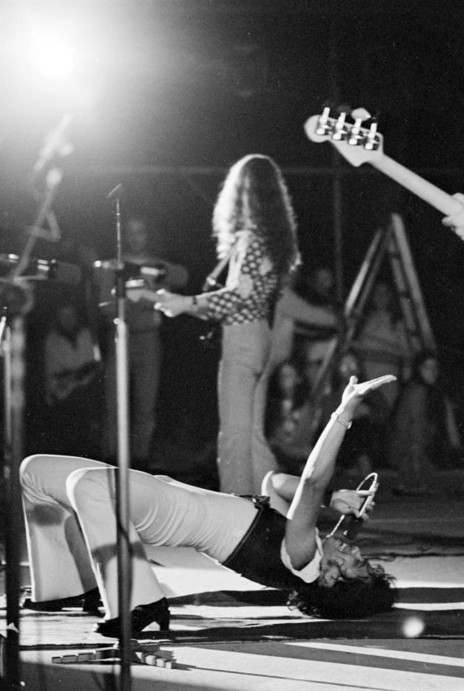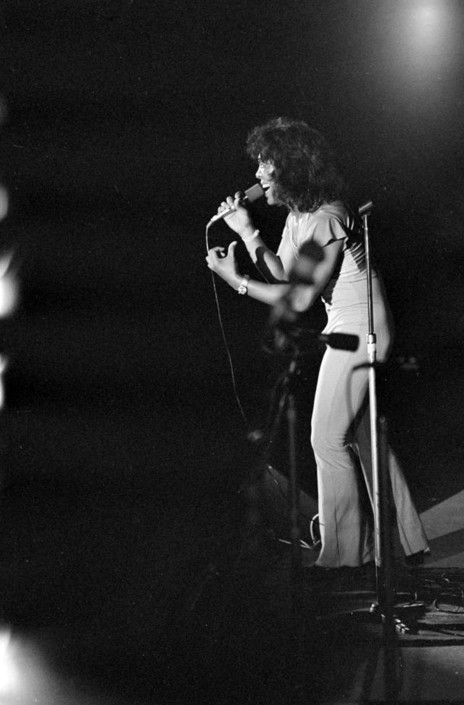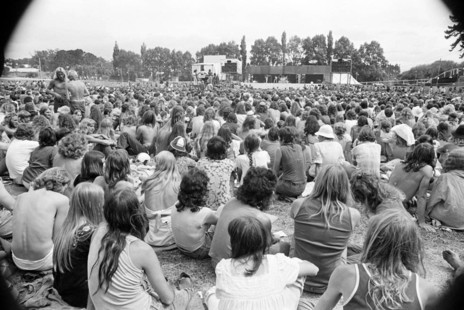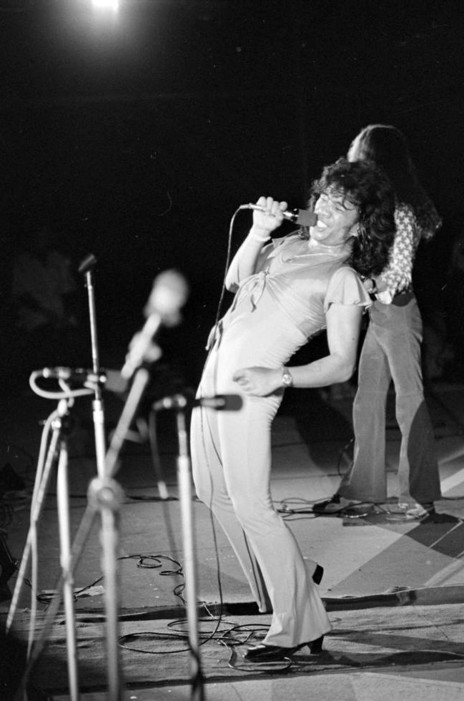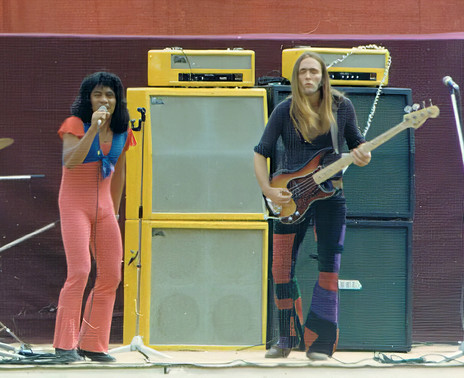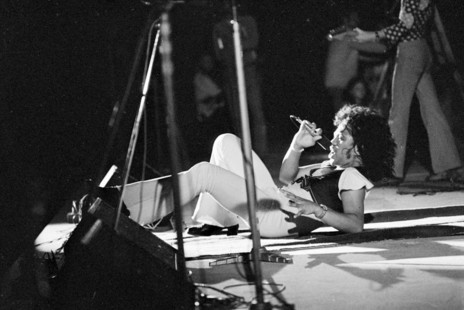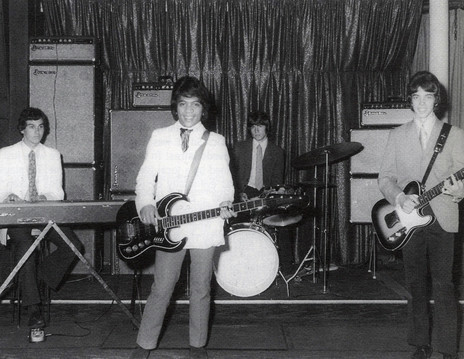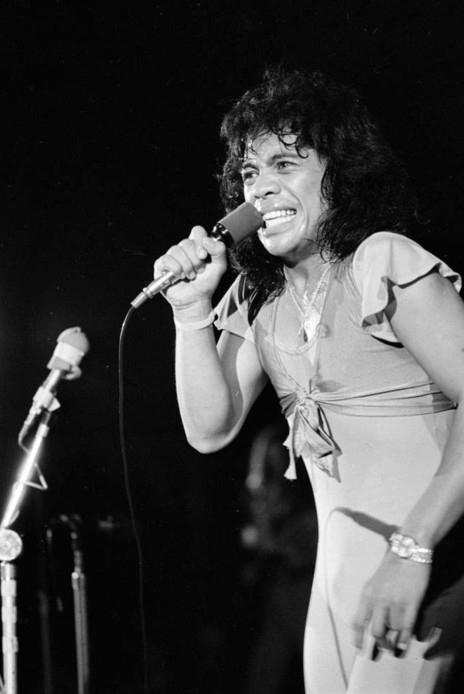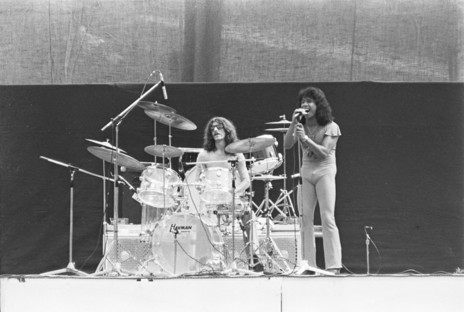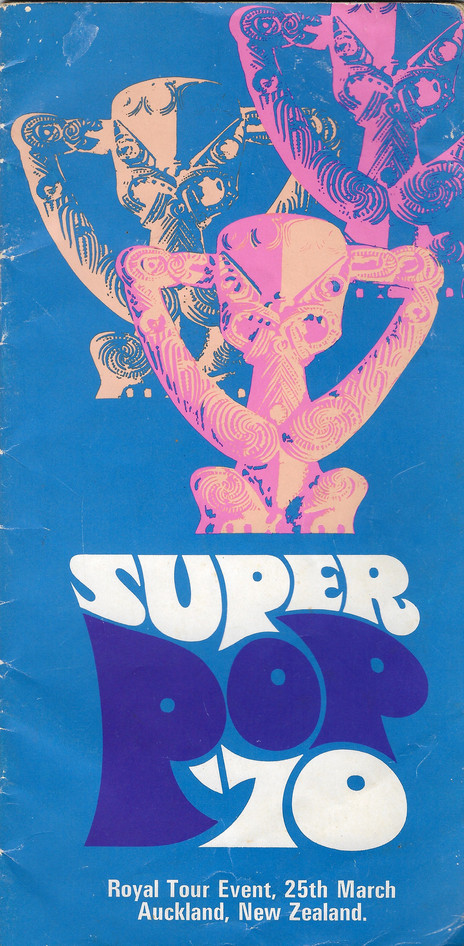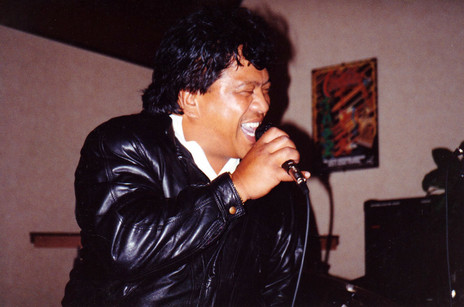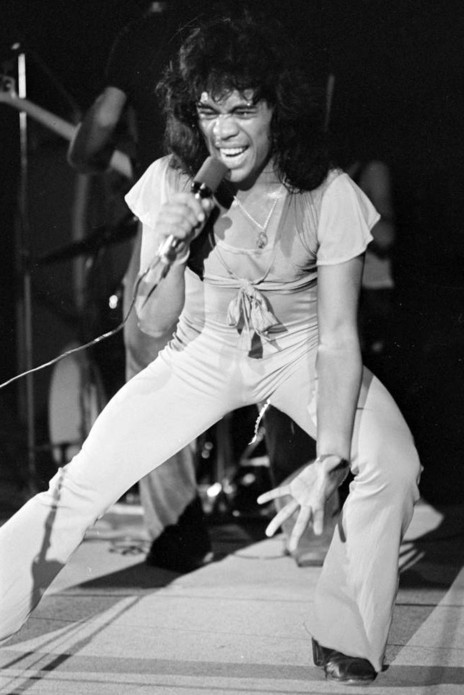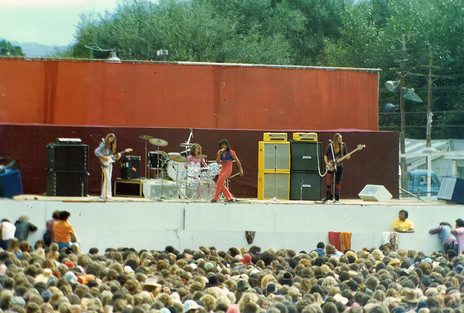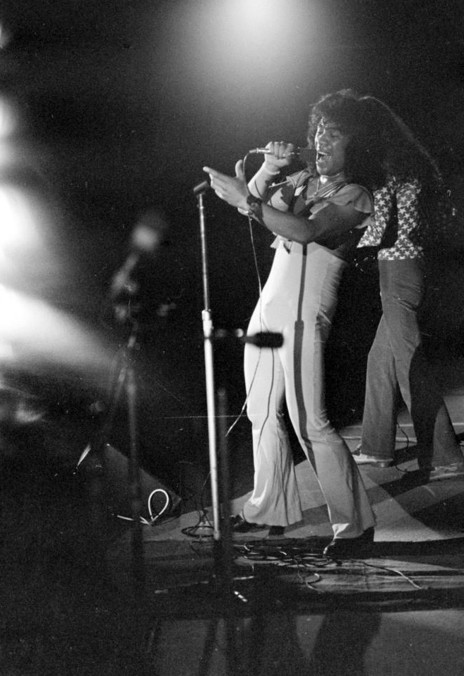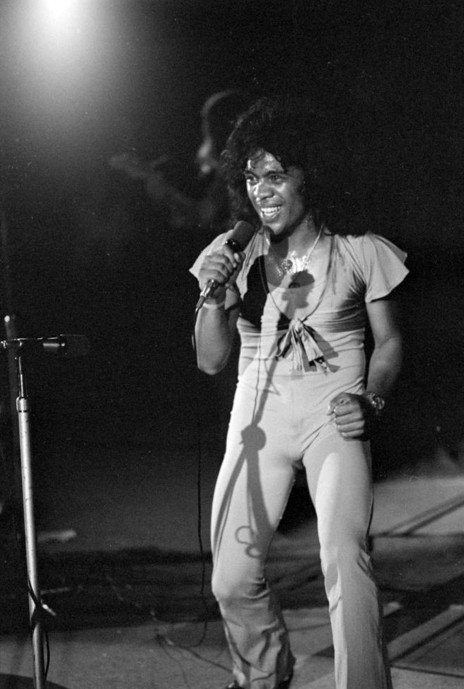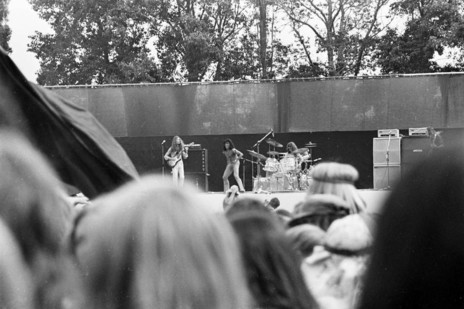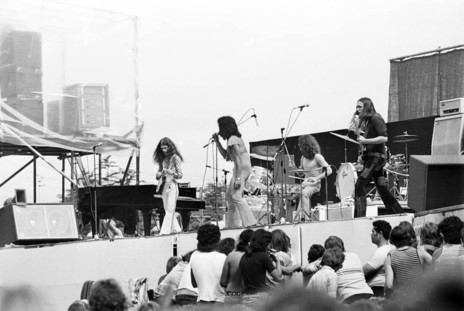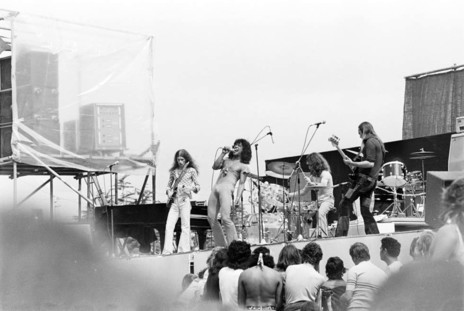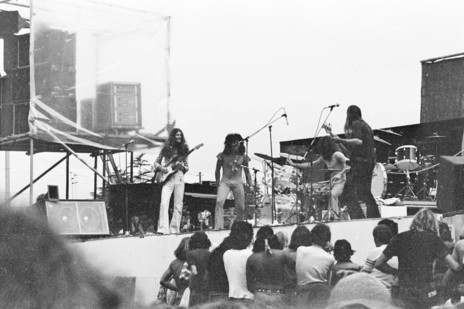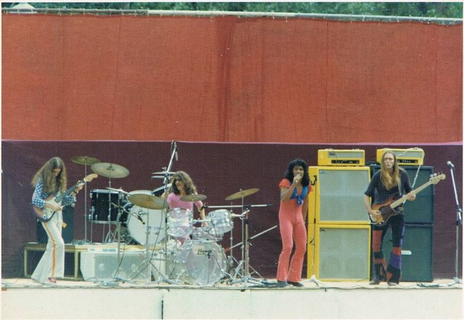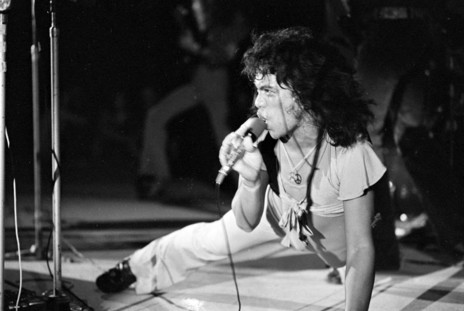Born in 1949, Raureti Reginald Ruka Korako was raised in the Hokianga and later Whangārei and throughout 1963 his first band, The Hangmen, was playing the city dance halls, youth clubs and surf clubs. The trio featured John Leigh Calder on piano and Billy Taitoko (Billy T James) on guitar. Reg played bass.
Keith Murch, a later bandmate of Ruka’s, remembers that bass. “It was a big, bulky Burns Bison. Reggie would drop it, sometimes in mid song, and he would become James Brown.”
Graeme Nesbitt was a schoolmate, who cited Reg as an influence. The future promoter, tour manager, record producer and band manager recalled sneaking down to Auckland together to attend dances and concerts, even the Beatles, although I suspect that the pair was outside with the throngs, rather than with the paying punters inside.
In 1966 Peter Grattan was playing in a teenage group called The Clan. “I first met Reg in 1966 at Whāngarei Boys High. Reg was a legend at school, he’d won a singing contest, been in a band with John Calder and Billy T Taitoko. The arrangement we had was that I would do Reg’s French homework and he would loan us (The Clan) his bass amp.”
Around this time Reg joined a long-serving band called The Decibels. The band members were all in their twenties, Reg was 16. “They wore suits!” Grattan recalls. “But he did some good gigs with them. The Clan should have got him as our lead singer. We were young, we had little personality, Reg had enough personality for five of us. He sold our bassist Gary Williams his big black bulky Burns Bison bass. Not sure it was Reggie’s to sell, mind!”
Grattan muses that Ruka was “mentored” by Paul Newberry, a local funeral director and live music venue proprietor. And women! The girls just loved Reginald Ruka. “He had a gorgeous girlfriend called Lex Davis, and there were others. And he was growing musically. Reg had soul when none of us really knew what it was.”
“Reg had soul when none of us really knew what it was.” – Peter Grattan
Classic Affair was formed in November 1968, comprising Reggie on bass and vocals, Peter Timperley (guitar), Pat Pukeroa (keyboards) and Peter Topp (drums). Early in the new year, the band successfully auditioned at several Auckland nightspots, enough encouragement to organise a permanent shift south. Pat Pukeroa had commitments, was replaced by Keith Murch, who in turn was replaced by Bob Patient. The other change in early 1969 was the recruitment of Billy Williams as bassist, allowing Reg to concentrate on vocals.
Things started falling into place for Classic Affair. They performed a dozen or more times week after week, including a nightly residency at the Monaco, they appeared on the C’mon TV show, released their debut single on HMV, ‘Little Red Book’ / ‘Love Machine’, and finished the year as part of the C’mon ’69 Stage Spectacular, touring the North Island.
The North Shore Times-Advertiser predicted the single would be a “sizable hit,” and noted that during Classic Affair’s residencies at the Galaxie and Bo Peep, what made the band special was the “18-year-old, five-foot five-inch package of incredible showmanship and personality by the name of Reggie Ruka.”
In March 1970 Classic Affair was part of the star-studded Super Pop ’70 concert at Western Springs Stadium for the enjoyment of their majesties Prince Charles and Princess Anne. Veteran Auckland Star columnist Robert Gilmore, possibly regurgitating a press release, wrote: “Little, formally mannered Māori soul performer Reggie Ruka, of Whāngarei, has lasted 50 hours in a dance marathon and leaps and lunges in his act. He will be presented to the Royals.”
This was the big time, Reg’s big moment. He would show them. And he did show them.
Billy Williams remembers the night. “After we started our set I wondered why Reggie was dancing strangely, coming towards me and holding his pants. When I looked down I saw that his pants had split open. When we got to the Monaco the following week a dude from the Public Relations Office came into the band room wanting to talk to Reggie, saying he had done it on purpose and he might be charged with indecent exposure! Which is when Don Lylian, the Monaco manager, walked in and told this guy he couldn’t just walk into his club and harass us and had him marched out of the place. We never heard any more about it. So many stories, but that’s a ripper. Literally!”
A hard act to follow. There was an unlikely pairing with the 1910 Fruitgum Company for a national tour as support act, and that was it basically. They fulfilled a few obligations, gig-wise, around town and called it a day. Australia was beckoning Reggie Ruka.
According to the NZ Herald, however, he took a detour while over the Tasman. Also on the plane were some cousins from Kaikohe – the Māori Hi-Lites. They were about to join a cruise liner as the on-board entertainment. Reg was quickly recruited as singer, bass player, and trumpter. When the ship arrived in France, Reg went ashore for a day trip, and ran into another Māori showband that included some cousins: the Travelaires. The groups reshuffled some members and Reg became a Travelaire to tour Holland and France. “In Paris, Ruka got restless for the Southern Hemisphere. So he returned to Australia, determined to form his own showband troupe to take back to Europe under his own management.” Ruka said he also performed in Playboy Clubs in Europe and the United States.
Ruka’s first band in Sydney was Everton Park, largely filled with expatriate New Zealanders. Reggie Ruka’s exuberance won him instant fans. He was no superstar but he would always find a gig with this band or that band. Itambu, the mysterious Itambu, was one such band. Does anyone have any definitive information about Itambu? It’s unlikely Reggie formed the group, the band name just doesn’t fit. They’re such a mystery. Who played in the band? I believe that Peter Timperley played in a later line-up of the band, and maybe Yuk Harrison. Peter isn’t saying and Yuk can’t remember.
Itambu’s first New Zealand performances – there were two of them, one night-time, one day-time – were at The Great Ngāruawāhia Music Festival, followed a month later by the audacious support performance before the Rolling Stones. And there was a national tour, which displays the other side of Reg Ruka. Mischievous?
One of New Zealand’s top bands was planning an Australian visit. Why not, suggested Reg, do a swap? We’ll use your equipment for our New Zealand tour and you can use ours for your Australian tour. Brilliant, said everybody. Well no, actually. Itambu’s tour went ahead but there was no sign of Reg or Itambu when the New Zealand band touched down in Sydney.
Throughout the seventies, Ruka largely survived as a soloist, on both sides of the Tasman. In October 1973, for no apparent reason, he changed his name to Andre Santos and it was as Andre Santos that he provided vocals and bass guitar in Mississippi. He was out before Christmas, replaced by another Kiwi, Charlie Tumahai. Mississippi evolved into the Little River Band, and Ruka returned to Northland to be with his ailing father. “Boy, was I glad to be back,” he told the Auckland Star in 1980. “I hadn't had a chance to speak Māori for years.”
Meanwhile, in New Zealand, Reggie – not Andre Santos, that nonsense didn’t last long – plied the Hegan Entertainment circuit of supper shows and 20-minute floor shows. Reg’s repertoire was culled straight from the great black American songbook – Sam Cooke, Otis, Motown, basically the repertoire he would repeat for the rest of his career.
In 1980 there was a new Reg Ruka on the scene, with no room for rock’n’roll, much less soul.
12 Bar Rhythm ’n Shoes was a middle-of-the-road song-and-dance show. Pretty cheesy but New Zealand loved it. It ran for three seasons, making stars out of Suzanne Lee and Richard Eriwata. Reg’s success paled against theirs. He was a familiar face but genuine stardom continued to elude him.
Mark Heke vividly remembers the first time he saw Reggie Ruka. “It was the late 60s and Reg was signing autographs outside a record store in Whāngarei. He thought he was Mick Jagger. He was always great at promoting himself.”
“He thought he was Mick Jagger. He was always great at promoting himself” – Mark Heke
Ten years later, give or take, Heke was working as a barman at the Warkworth Hotel. “I think Reg had seen me with a guitar or an amp in my car, I can’t quite remember but he asked me to join his band and I said who’s in the band and Reg said you and me.
“Later, a year or so, he put the band into a motel in Herne Bay and we were there for, like, two months, [it was] very rock’n’roll. And then at 2am one morning, he says, ‘Okay, that’s it, let’s go. We’re out of here. Like, now.’”
Ruka’s lackadaisical use of the funding he received from Billy T James’ “Dream Factory” almost finished their lifelong friendship but it gave Reggie ideas and fully-funded mentoring programmes or similar would now always figure in his plans. Along the way, there were rumours of dodgy reconciliations, and shenanigans with a pastor’s daughter during a South Auckland church-sponsored programme.
Reg played gigs at Tribesmen and Headhunters’ pads, he had no particular allegiance. One night a trio of Headhunters turned up and threw him in the car. Next day Reg had a broken arm.
In Wellington, there was a massive building off Adelaide Rd in Newtown. A quarter of it was taken up with a trust founded by Raureti Reginald Ruka Korako and this section alone was huge. In the maze of empty rooms, Reggie Ruka wanted to set up the ultimate mentoring programme, using music to break through to disadvantaged kids. Reggie recruited Whāngarei mates: Keith Murch to run the keyboards module, Jim Lawrie on the drum seat, and Kemp Tuirirangi as lead guitarist. Everyone was just waiting for the money to come through, nothing to do but wait until the funding is confirmed.
“I got a phone call about 11pm,” Jim Lawrie recalls. “Reg telling me not to waste a second and to go and pick up my drum kit now.” The call went out to everyone. Abandon ship! In a futile act of defiance, Reg locked the gates to keep the bailiffs out.
Jim Lawrie tells another story about Reg Ruka, from happier days. “I was playing in the Dennis O’Brien Band at the St George when Reg came in. He asked to sing a song with us. ‘My Girl’, from memory. There was a table of young ladies there and, unfurling the mic lead, he crossed the room and dropped to his knees, hamming it up. Dressed to the nines, as always, a class act no matter what.”
The last time I saw Reg Ruka, in the early 2000s, was at The Alhambra, the Ponsonby jazz bar and restaurant. The Master, Rufus Rehu, was holding court. I didn’t recognise Reg at first, across the room. His hair, grey now, was tied back in a pony tail which hung all the way to his belt. He sang ‘Pain in My Heart’, Otis Redding. It was faultless.
Last word to John Leigh Calder. “I remember meeting Reggie about 69-70, he was doing three nights so I hung out with him. On the first night he told the audience he had been busted on drugs, but drugs are a terrible thing – audience applause. On the second night he said his fly buttons had burst on a Royal Command Performance for Prince Charles and Princess Anne and it was not meant to happen and he was very sorry – audience applause. On the third night Reg was stoned out of his head and his fly buttons burst open. Now that’s rock’n’roll.”
Reg Ruka died on 25 July 2016.
--
Read more: Classic Affair
